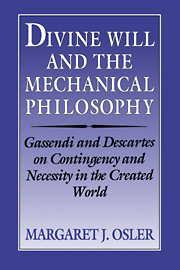 Divine Will and the Mechanical Philosophy
Divine Will and the Mechanical Philosophy Book contents
- Frontmatter
- Contents
- Acknowledgments
- Introduction
- Part I Theology and the philosophy of nature
- 1 Divine power and divine will in the Middle Ages: Historical and conceptual background
- 2 Baptizing Epicurean philosophy: Gassendi on divine will and the philosophy of nature
- 3 Providence and human freedom in Christian Epicureanism: Gassendi on fortune, fate, and divination
- 4 Theology, metaphysics, and epistemology: Gassendi's “science of appearances”
- 5 Eternal truths and the laws of nature: The theological foundations of Descartes' philosophy of nature
- 6 Gassendi and Descartes in conflict
- Part II The mechanical philosophy and the formation of scientific styles
- Bibliography
- Index
3 - Providence and human freedom in Christian Epicureanism: Gassendi on fortune, fate, and divination
Published online by Cambridge University Press: 11 September 2009
- Frontmatter
- Contents
- Acknowledgments
- Introduction
- Part I Theology and the philosophy of nature
- 1 Divine power and divine will in the Middle Ages: Historical and conceptual background
- 2 Baptizing Epicurean philosophy: Gassendi on divine will and the philosophy of nature
- 3 Providence and human freedom in Christian Epicureanism: Gassendi on fortune, fate, and divination
- 4 Theology, metaphysics, and epistemology: Gassendi's “science of appearances”
- 5 Eternal truths and the laws of nature: The theological foundations of Descartes' philosophy of nature
- 6 Gassendi and Descartes in conflict
- Part II The mechanical philosophy and the formation of scientific styles
- Bibliography
- Index
Summary
Fate is the decree of the divine will, without which nothing at all is done, … [and] Fortune is the concourse of events that, although unforeseen by men, nevertheless were foreseen by God.
Pierre Gassendi, Syntagma philosophicumHaving ensured that divine providence played a major role in his mechanical philosophy, Gassendi turned to the question of human freedom in Book III of the “Ethics,” the last part of the Syntagma philosophicum, entitled “On Liberty, Fortune, Fate, and Divination.” In this concluding section of his magnum opus, Gassendi cast his discussion in the form of a debate among the major classical philosophies, particularly Stoicism and Epicureanism. The main issue was freedom – human and divine. While questions about fate, fortune, and divination may, at first glance, appear rather remote from the primary concerns of seventeenth-century natural philosophy, in fact they involve metaphysical issues central to the articulation of the mechanical philosophy: the extent of contingency and necessity in the world, the nature of causality, and the role of providence and the extent of human freedom in a mechanical universe. Gassendi's treatment of these issues reflects his underlying voluntarism.
Since classical times, natural philosophers had dealt extensively with questions about fate, fortune, and divination. The concept of fate was central to Stoicism, which had explained the world as governed by a deterministic, rational ordering principle, the Logos. According to Stoic doctrine, fate is the expression of the Logos in the causal nexus of a deterministic universe.
- Type
- Chapter
- Information
- Divine Will and the Mechanical PhilosophyGassendi and Descartes on Contingency and Necessity in the Created World, pp. 80 - 101Publisher: Cambridge University PressPrint publication year: 1994


